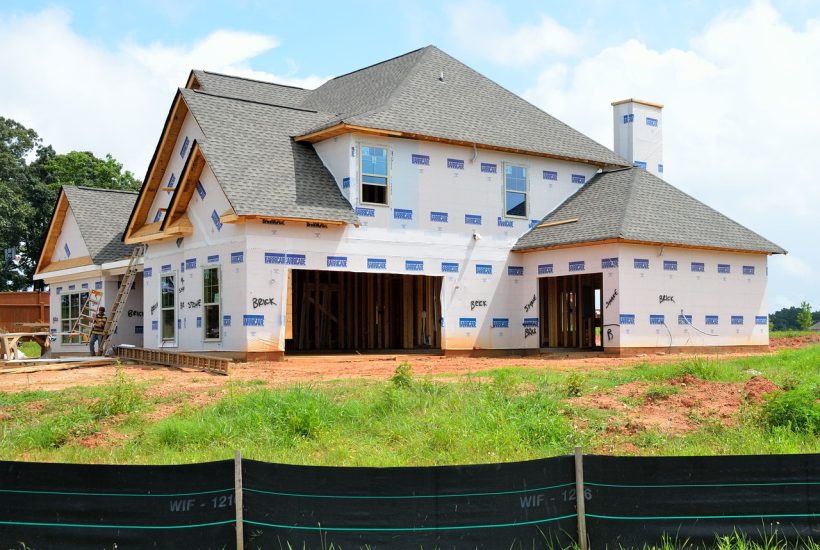Featured
How to Reduce Energy Consumption and CO2 Emissions in the Real Estate Sector
The real estate market is responsible for 37% of global CO2 emissions. For this reason, monitoring ESG performance, for players in the sector is crucial. Deepki has created the ESG Index, in collaboration with IEIF. The index is the first in Europe to measure the ESG performance of the real estate market with the aim of helping industry players understand their portfolio performance.

More and more people are talking about “net zero”: achieving “zero emissions” of greenhouse gases to curb global climate warming. The goal, set in the Paris Agreement, aims to limit global warming to +1.5°C by the end of the century. Hard to say and also hard to do; but there are several entities that are trying. Among them, Deepki, founded in 2014, has developed a SaaS solution that uses data intelligence to guide real estate players in the transition to net zero.
The real estate market itself is responsible for 37 percent of global CO2 emissions, but aims to reach net zero by 2050, according to goals set by the World Green Building Council Net Zero Carbon Buildings Commitment. A survey conducted by Deepki shows that 80 percent of asset managers intend to divest from low-performing buildings. To achieve net zero goals, Deepki aims to work with property owners on a path to first understanding the energy consumption of their assets and then making sure everything is running as efficiently as possible.
Read more on the subject and find the most important business headlines of the day with the born2Invest mobile app.
Deepki, through its platform, helps its clients improve ESG (Environmental, Social and Governance) performance and maximize asset value
Founded in 2014 by Vincent Bryant and Emmanuel Blanchet, engineers in the construction and energy sectors, it now operates in more than 39 countries and has more than 200 experts in offices in Paris, London, Berlin, Milan, and Madrid. Using data intelligence, it guides investors, owners, and managers of real estate assets on their journey to decarbonize and improve ESG performance. It is a scalable SaaS platform based on data intelligence that enables clients (investors, property owners, and asset managers) to collect ESG data, define sustainability pathways, get a comprehensive overview of their ESG performance and share it with their stakeholders, thus facilitating their transition to net zero.
This tool is also complemented by an advisory service, Deepki Advisory, with ESG experts working with clients to collect and analyze data through to strategy definition and implementation. Also designed for Real Estate players is Deepki Success, a professional service offering technical support and training. Its clients include Generali Real Estate, AEW, Primonial REIM, SwissLife Asset Managers, and the French government. In Italy, Deepki has had a presence since 2018, based in Milan.
In 2021, it reported 100 percent growth over 2020, and in March 2022 it secured a Series C funding round of 150 million euros. In May, it acquired Fabriq, a market-leading SaaS solution in the UK. The company previously raised €2.5 million, in 2016, from Demeter and Hi Inov (Dentressangle) and, in 2018, completed an €8 million Series B from existing shareholders and Statkraft Ventures and Citizen Capital.
ESG: why is it important to monitor performance in real estate?
As mentioned earlier, the real estate market is responsible for 37 percent of global CO2 emissions. For this reason, monitoring ESG performance, for players in the sector is crucial. Deepki has created the ESG Index, in collaboration with IEIF (Institut de l’Epargne Immobilière et Foncière). The index is the first in Europe to measure the ESG performance of the real estate market with the aim of helping industry players understand their portfolio performance and address the decarbonization challenges defined by the European Taxonomy.
Accessible for free online, the benchmark will provide “top 15 percent” and “top 30 percent” building benchmarks broken down by use and country, in terms of primary and subsequently final energy consumption and CO₂ emissions. Through the automated collection of data from more than 400,000 buildings in 41 countries, the Index is able to return detailed information to the market on the energy performance of the building stock, broken down by use (office, retail, residential, logistics, healthcare facilities) and location. Published and updated annually, Deepki’s benchmark reflects the status of the European market and its evolution.
Among the notable data that emerge, the benchmark shows that:
15% of office buildings with the best energy performance in Italy consume 202 kWhEP/m2 per year;
30% of office buildings with the best energy performance in the United Kingdom consume 168 kWhEP/m2 per year;
health care facilities in Germany consume an average of 230 kWhEP/m2 per year;
15 percent of the buildings of the best-performing logistics in Europe consume 44 kWhEP/m2 per year.
In Italy, six out of 10 commercial real estate asset managers have seen energy costs rise by more than 50 percent, and 80 percent intend to divest poorly performing buildings.
These are the findings from the “Overcoming the energy crisis in commercial Real Estate” survey conducted by Deepki, which reveals that 14% of respondents (among 250 commercial real estate managers in Italy, the UK, Germany, France, and Spain) acknowledged even greater growth in energy consumption, ranging from +71% to +90%. To cope with high energy prices, most (76%) are accelerating plans.
The need for more energy-efficient commercial buildings is also evidenced by the rise of the “Green Premium” phenomenon: the increase in value of the most sustainable buildings. In fact, 24% of respondents note an increase in value of between 11% and 15% for this type of asset, 22% note a growth of between 5% and 10%, while for one in ten the revaluation is as high as +20%. Data that testify to the growing demand for more efficient buildings from occupants and the people who use them.
On the other hand, 70% predict that the energy crisis will deeply penalize those buildings that do not perform well in terms of energy efficiency. These poorly performing assets will be sold faster than initially planned, according to 80 percent of respondents. “Companies are coming to terms with the costs of the energy crisis, and commercial real estate is no exception,” commented Claudia Scarcella, Country Manager of Deepki Italy. “However, instead of halting investment, the sector is taking action, accelerating plans to improve the energy efficiency of buildings or reviewing its strategies on less performing properties
__
(Featured image by paulbr75 via Pixabay)
DISCLAIMER: This article was written by a third party contributor and does not reflect the opinion of Born2Invest, its management, staff or its associates. Please review our disclaimer for more information.
This article may include forward-looking statements. These forward-looking statements generally are identified by the words “believe,” “project,” “estimate,” “become,” “plan,” “will,” and similar expressions. These forward-looking statements involve known and unknown risks as well as uncertainties, including those discussed in the following cautionary statements and elsewhere in this article and on this site. Although the Company may believe that its expectations are based on reasonable assumptions, the actual results that the Company may achieve may differ materially from any forward-looking statements, which reflect the opinions of the management of the Company only as of the date hereof. Additionally, please make sure to read these important disclosures.
First published in StartupItalia, a third-party contributor translated and adapted the article from the original. In case of discrepancy, the original will prevail.
Although we made reasonable efforts to provide accurate translations, some parts may be incorrect. Born2Invest assumes no responsibility for errors, omissions or ambiguities in the translations provided on this website. Any person or entity relying on translated content does so at their own risk. Born2Invest is not responsible for losses caused by such reliance on the accuracy or reliability of translated information. If you wish to report an error or inaccuracy in the translation, we encourage you to contact us.

-

 Impact Investing4 days ago
Impact Investing4 days agoBNP Paribas Delivers Record 2025 Results and Surpasses Sustainable Finance Targets
-

 Biotech2 weeks ago
Biotech2 weeks agoTwogee Biotech Advances Industrial Enzyme Solutions for Circular Production
-

 Crypto1 day ago
Crypto1 day agoUniswap and BlackRock Partner to Launch BUIDL in DeFi
-

 Cannabis1 week ago
Cannabis1 week agoScientifically Verified F1 Hybrids Set New Benchmark for Indoor Cannabis Yield and Consistency
























